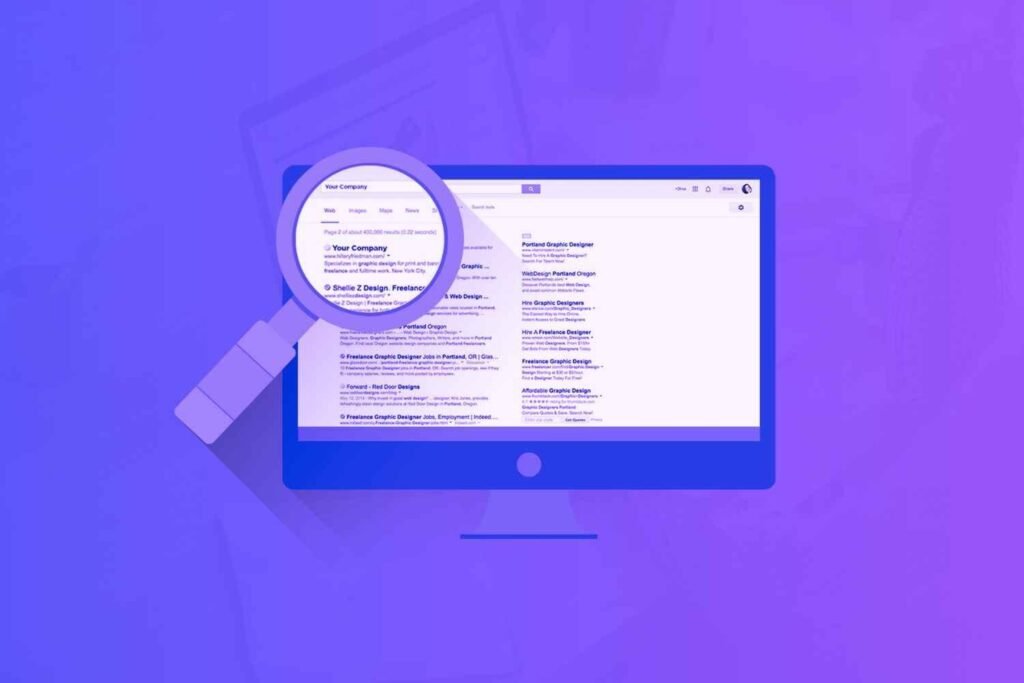SEO tools have come a long way, but there’s no end to the Semrush vs Ahrefs debate. This is understandable, since both these platforms are crowd favorites. Each has its own set of loyal users and fans.
On the surface, Semrush and Ahrefs have similar features. With either, you can audit your website’s SEO, conduct keyword research, analyze backlinks, examine competitors, and track search engine rankings.
But if you dig deeper, there are some key differences between the two. In fact, if you have full freedom in terms of budget, I’d recommend that you use both.
Unfortunately, subscribing to both Ahrefs and Semrush can be really expensive. So you’ll likely want to pick one. So in this post, I’ll help you identify the SEO tool that’s most suitable for your needs.
Disclaimer: If you buy any products through links on this site, I may earn a commission. But it doesn't make any difference to your cost, and it helps me keep this blog running. So you could always read my articles for free.
What is Semrush?
Semrush is a diverse and complete online marketing solution with a comprehensive set of tools for your social media, SEO, content marketing, and PPC advertising needs.
In terms of SEO and paid search, its features include technical audit, keyword research, competitor analysis, and rank tracking.
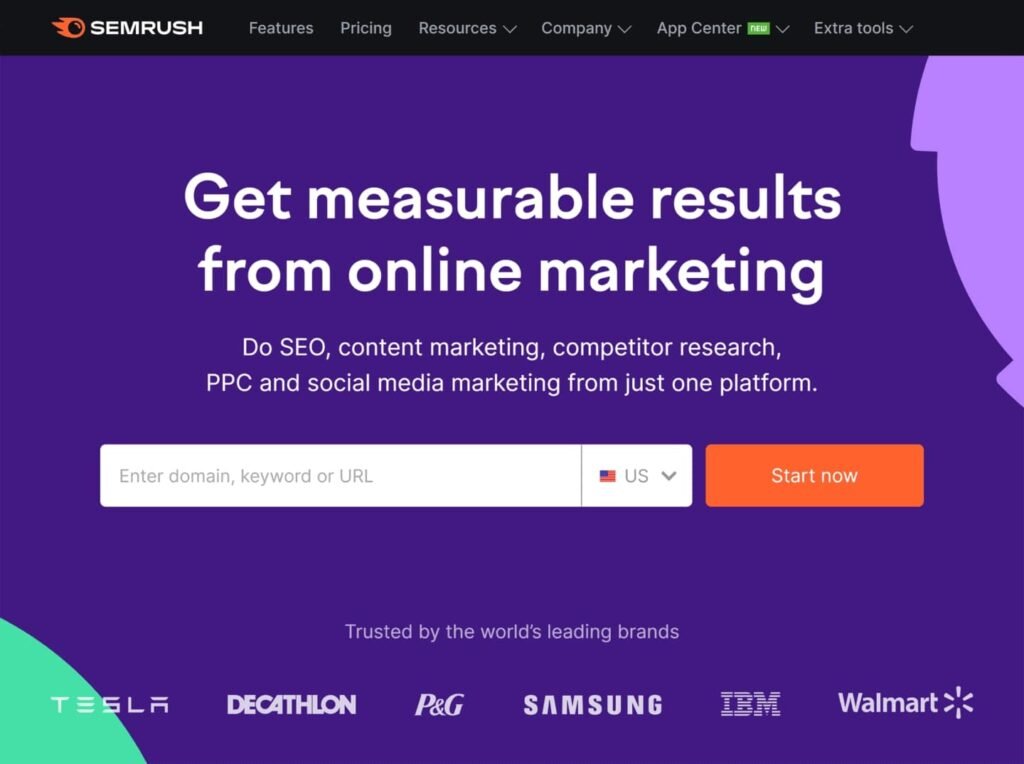
These features give you a ton of actionable data that you can use to improve your website’s performance, achieve top search rankings, and optimize advertising campaigns.
With tools for domain analysis, position tracking, and content optimization, you get everything you require to excel in the competitive world of online business.
You can read my full Semrush review here.
Semrush key features
As discussed, one of Semrush’s highlights is the comprehensive feature set. Considering all these features, it’s still pretty simple to use. Let’s examine all the key features one by one.
Keyword research
Semrush has massive keyword database and several keyword research tools to help you learn about your target keywords from different perspectives.
These consist of keyword overview, keyword magic, keyword manager, position tracking, and organic traffic insights. Let’s examine them in detail.
Keyword overview: With the Keyword Overview tool, you can conduct a complete analysis of your chosen keywords fast. To begin, just type in your target keyword and location.
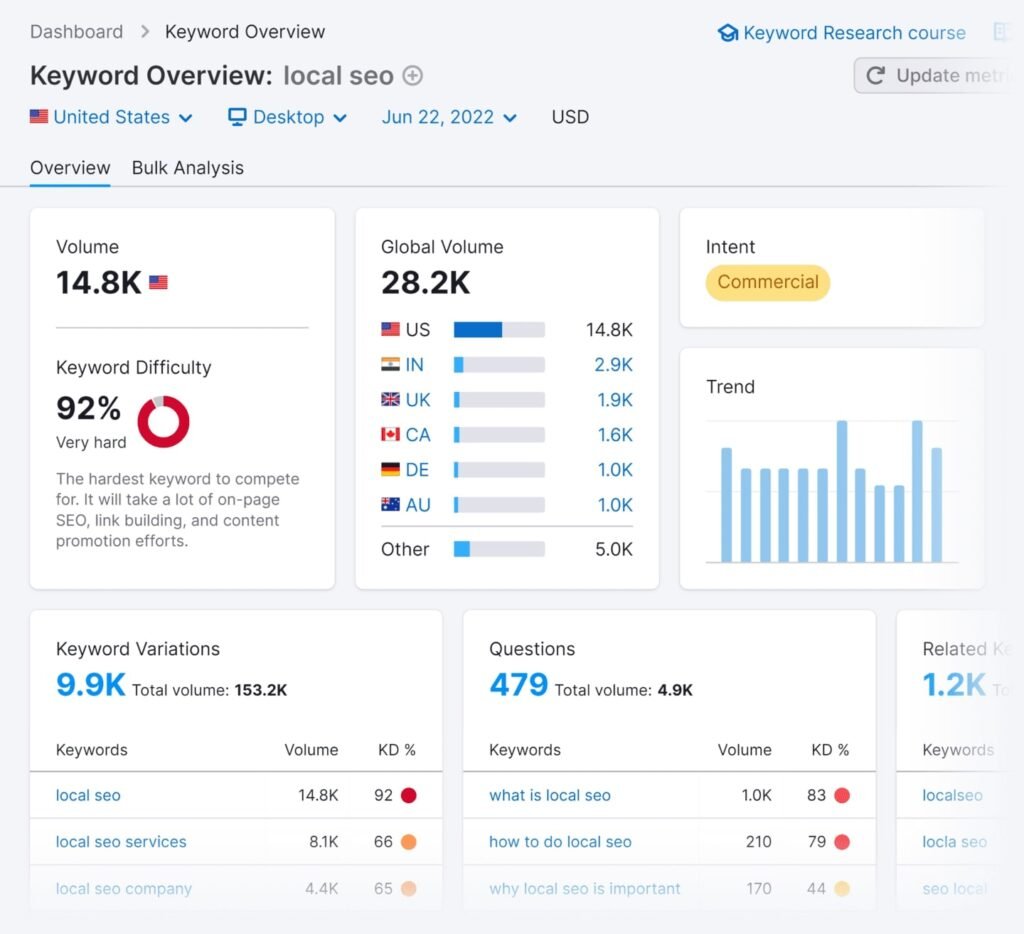
You’ll receive a full report with data points such as search volume, cost per click, keyword difficulty, and search trends. Plus, you get more in-depth insights, including:
- Total number of organic results
- Paid search data
- CPC distribution
- Phrase match keywords
- Queries and related keyword ideas
- Keyword suggestions
Besides that, you can also:
- Get thousands of content topics
- Import and export keyword lists
- Examine up to 100 URLs for a keyword
- Create custom keyword lists
Keyword Magic tool: This keyword tool has the potential to check more than 142 geo-databases and provide spectacular keyword ideas. To narrow down this data, you have several filters like Related, Broad Match, Exact Match, and Phrase Match.
But the feature that takes the cake is auto-grouping. It allows you to group keywords automatically based on shared stems. For example, the group with the step “shoes” will contain keywords such as “shoes for rains” and “shoes on sale.”
These groups help you dig deep into the keywords you are researching. As a result, you get more suitable keyword suggestions.
Keyword Manager: As you research keywords for your business, you’d often want to save and organize them for later. Semrush keyword manager makes it easy. You can export your chosen keywords as CSV or XLSX files, or even bring them into other Semrush areas.
Organic Traffic Insights: If you want to track the organic traffic you’re getting from search, this is the tool for you.
With this tool, you can fetch data from Semrush, Google Search Console, and Google Analytics, and bring it all in one location.
It then lets you assess your website’s performance in terms of KPIs like new users, total users, bounce rate, and average session duration.
Position Tracking: When it comes to SEO, it all boils down to search engine rankings. So another important tool that deserves a mention in this comparison of Ahrefs vs Semrush is rank tracking.
With Semrush, position tracking is really easy. Just pick your target keywords and Semrush will do the rest.
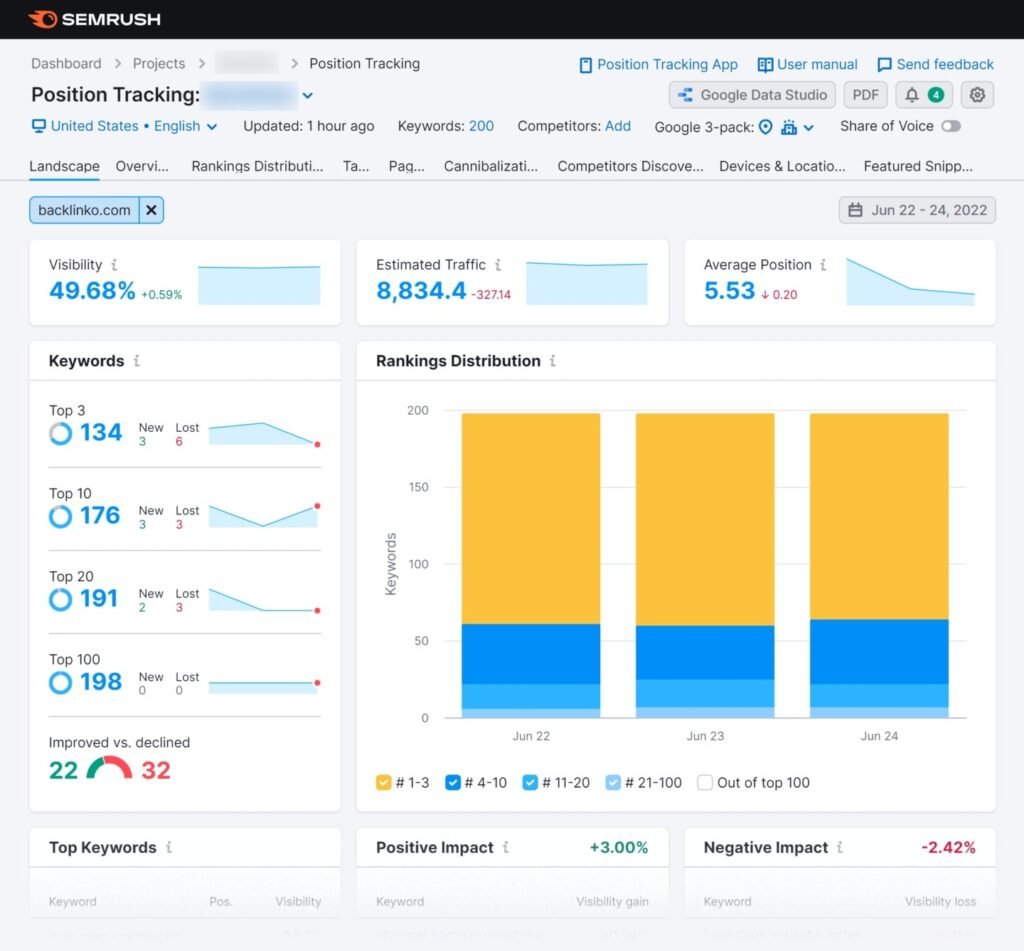
The best part? Unlike other SEO platforms, Semrush updates its ranking data every 24 hours.
With Semrush’s rank tracking report, you can also see the keywords where your website is performing the best, the ones for which your ranking has recently improved, and the ones where it has declined.
Competitive research
Semrush has several competitor research tools to get information about your competitors’ SEO efforts. These consist of domain overview, traffic analytics, organic research, keyword gap, and backlink gap. Let’s take a look at them in detail.
Organic Research: What if you could take a look at your competitors’ keyword strategies? That would almost be an unfair advantage, right? That’s what you get with this tool.
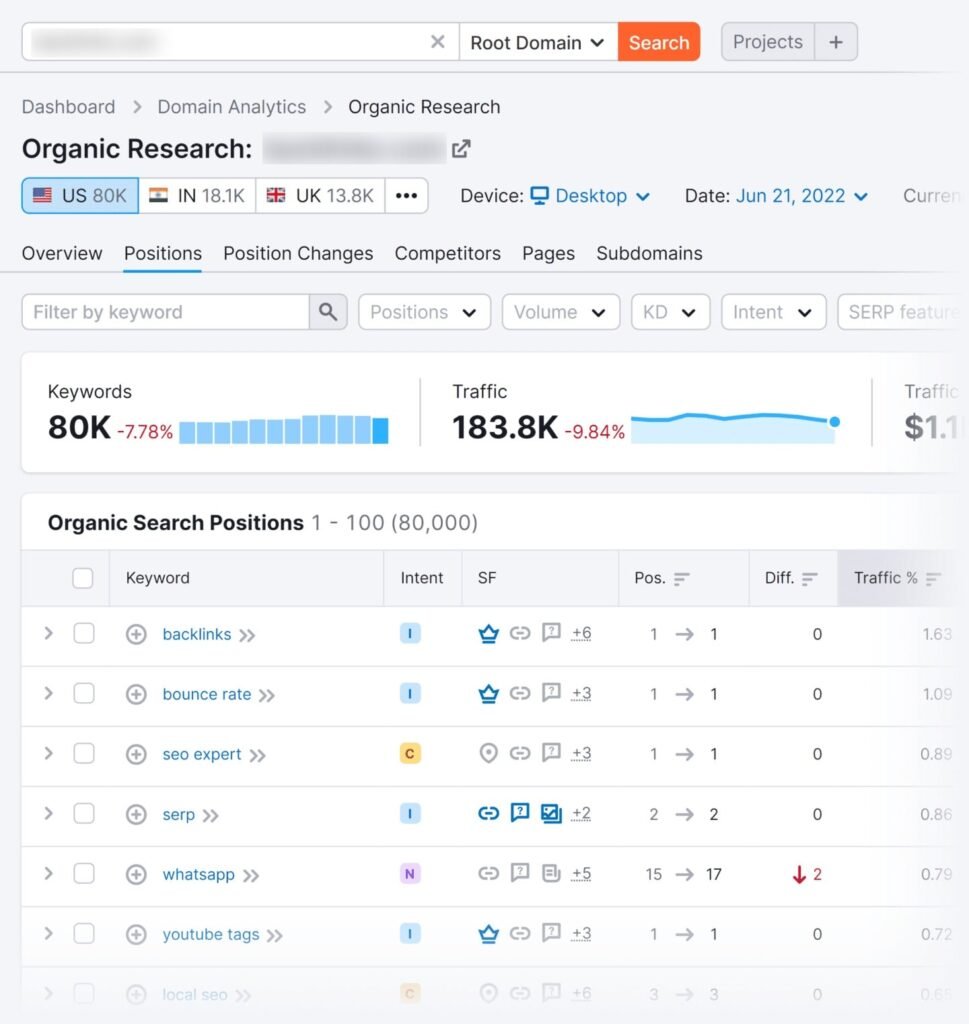
It lets you identify your competitors’ best-performing keywords and track how their rankings are updating. You can also discover organic competitors you didn’t know about.
Keyword Gap: This tool lets you find SEO opportunities by weighing your competitors’ keyword profiles to yours. Here, you can enter up to 5 domains, exact URLs, folders, and subdomains for comparison. Plus, you can identify keywords that overlap among your chosen domains.
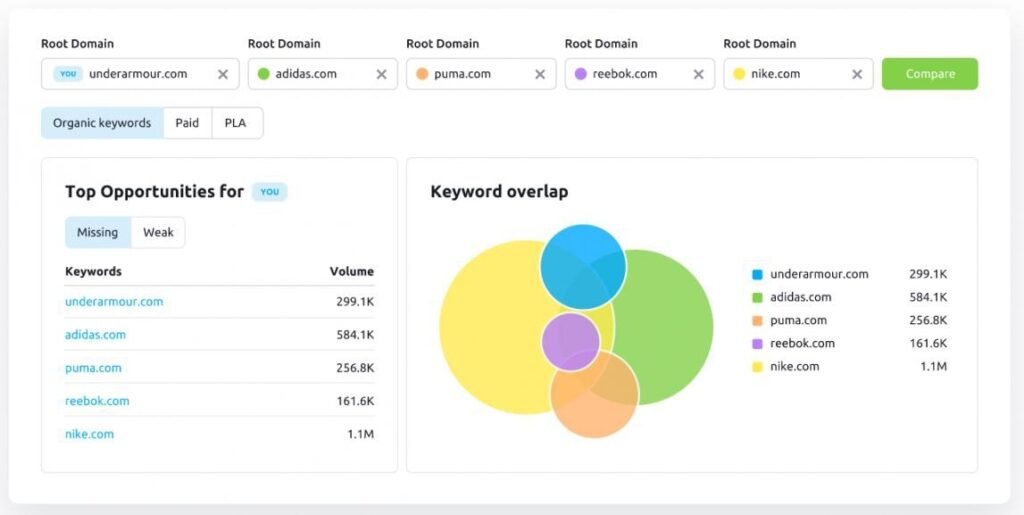
Backlink Gap: Similar to the Keyword Gap tool, the Backlink Gap tool lets you compare the backlink profiles for a maximum of five websites.
You can filter this data based on the time frame, which could be all time, the past year, or the previous three months. And use it to discover fresh opportunities to build backlinks.
Link building/management
Semrush comes with a set of powerful tools for link building and management. With Semrush, you can identify link building opportunities. Other than that, you can audit your backlink profile to check how your website is doing.
The link building tools you get with Semrush include backlink analysis, bulk analysis, link building, and backlink audit.
Backlink Analytics: This tool lets you analyze backlink profiles. The profile can be your own, or of one of your competitors.
How does it work? Just type in the URL or domain in the search bar and hit enter. You’ll then get several insights such as the website’s authority and referring domains.
Backlink audit: This tool gives you a complete overview of your backlink profile.
Here you get a comprehensive summary of your backlink profile. This tool allows you to identify and get rid of potentially damaging backlinks. And it does that by showing toxicity scores that are calculated from more than 45 markers.
Armed with this data, you can easily audit, disavow, or remove the spammy backlinks to protect yourself from a Google penalty or algorithm update.
Bulk Backlink Analysis: If you are looking to compare the backlink profiles of multiple websites simultaneously, this is the tool for you. In fact, you can submit a maximum of 200 URLs, folders, domains, or subdomains at the same time.
Link building: With this handy tool, you can have a quick glance at all your link-building efforts. Besides that, you can enter a target keyword and it can give you a list of target websites to approach for link building.
Technical SEO Audit
With Semrush’s SEO audit tool, you can view your website’s SEO health score. This industry-leading audit checks your website for over 140 errors and issues.
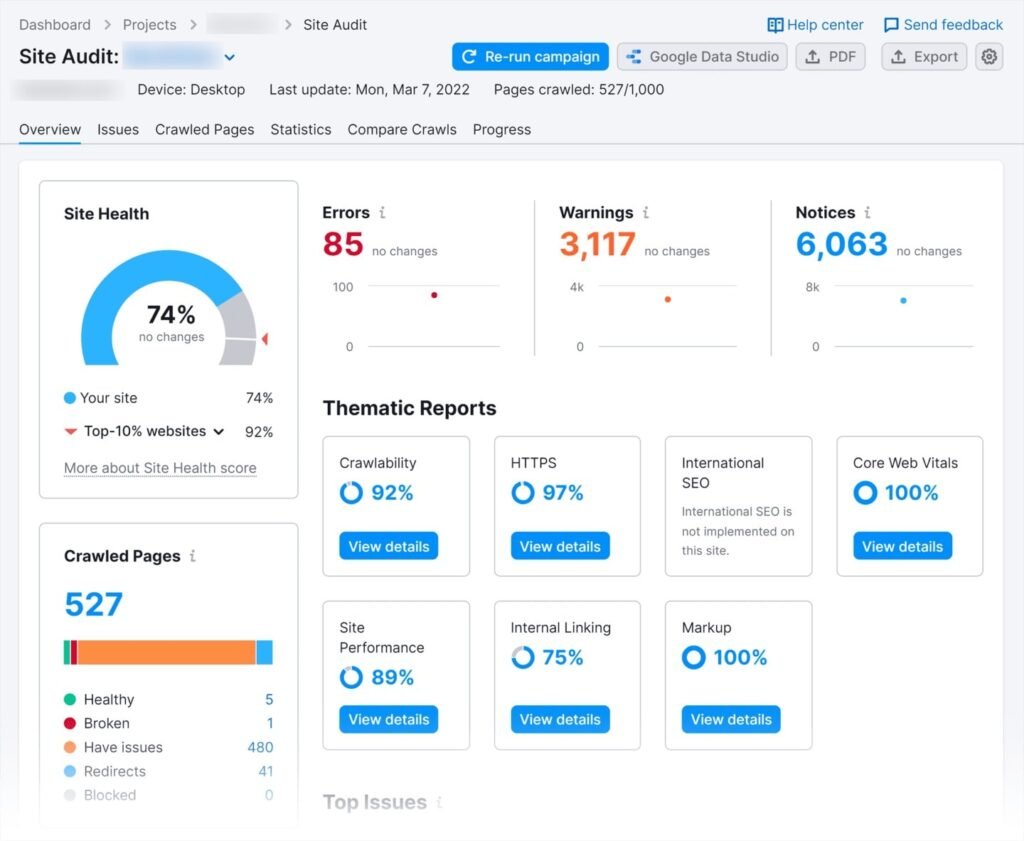
Based on the audit, Semrush provides actionable insights and recommendations to improve your website, such as:
- Keyword ideas
- Internal linking suggestions
- Content optimizations tips
The issues are grouped into three batches, depending on the level of threat they pose. These batches are notices, warnings, and errors. Semrush also tells you the frequency of these issues, along with those that need urgent resolution.
Not just that. You don’t need to run an audit manually every time. You can schedule the audit to run automatically every week. Once Semrush has crawled your website, you get detailed information on the following:
Internal link problems: This report includes issues such as too many links, broken links, and nofollow attributes.
Website crawlability: Here you can learn about your website’s visibility, crawlability, and indexability in the eyes of search engines.
Loading speed: This weely report shows you your website’s performance with regard to page loading speed, since it has a big impact on user experience.
Security: The HTTPS report allows you to track the status in terms of how secure your website is.
Compare Crawls: With this feature, you can compare the findings of several SEO audits and track performance over time.
All in all, Semrush’s SEO Audit tool is great at pointing out website problems that need improvement. This helps you attain higher spots in search engine results pages.
What is Ahrefs?
Ahrefs is a robust SEO platform. Digital marketing professionals and online business owners use it to boost their search engine rankings. Its comprehensive set of features include keyword research, backlink analysis, site auditing, and rank tracking.
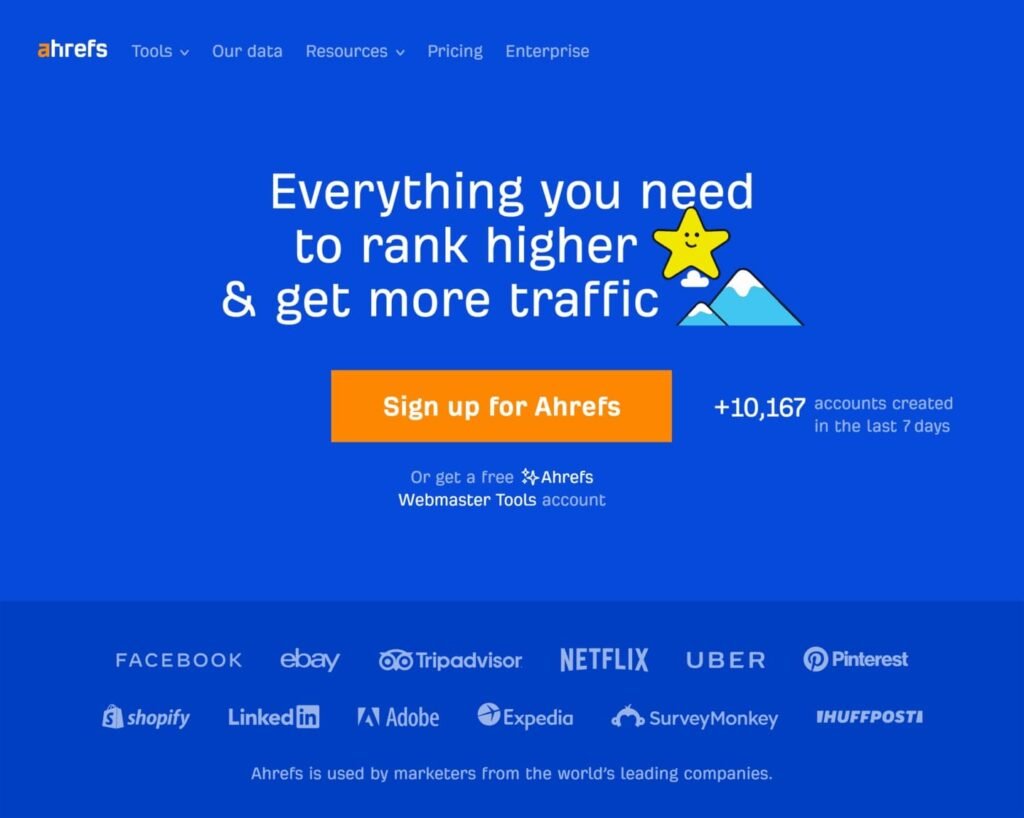
That being said, Ahrefs’ biggest competitive advantage is its backlink analysis tool. It lets you view a website’s link profile, from where you can check the website’s authority, find link-acquisition opportunities, and track competitors’ backlinks.
Ahrefs comes with the largest link index in the SEO industry. So its data is more trustworthy than other SEO tools. Beyond that, its clean interface and powerful capabilities make it a crowd favorite of marketing professionals worldwide.
You can read my full Ahrefs review here.
Ahrefs features
As with Semrush, Ahrefs provides several tools to conduct keyword research, SEO audits, backlink analysis, and position tracking.
Keyword Explorer
Ahrefs comes with powerful keyword research capabilities. Using these functions, you can inform and form your keyword strategy from A to Z. The keyword data includes:
- Keywords that contain your keyword
- Keyword suggestions with the same words as your seed keyword
- Queries that show up in Google’s ‘autocomplete’
- Recently found phrases and queries
- Pages that rank near the top for your keyword
Let’s break all this down to separate features offered by Ahrefs.
Keyword ideas and analysis: As you’d expect from any top-notch SEO software, Ahrefs can provide thousands of keyword suggestions quickly. Just type in your seed keyword and location. And you’ll get a huge list of related keywords.
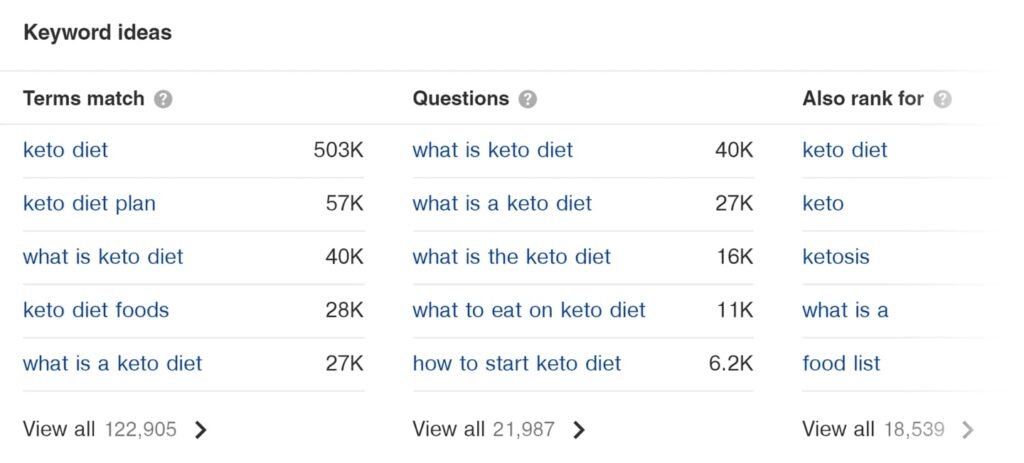
From there, you can view SEO difficulty, search volumes, parent keywords, cost per click (CPC), and more insights. Another upside is that you can check up to 10,000 keywords in a single go.
Competitor keyword analysis: Head over to the Site Explorer tab and then go to ‘Organic Search’. Once you’re there, type in your competitor’s domain name.
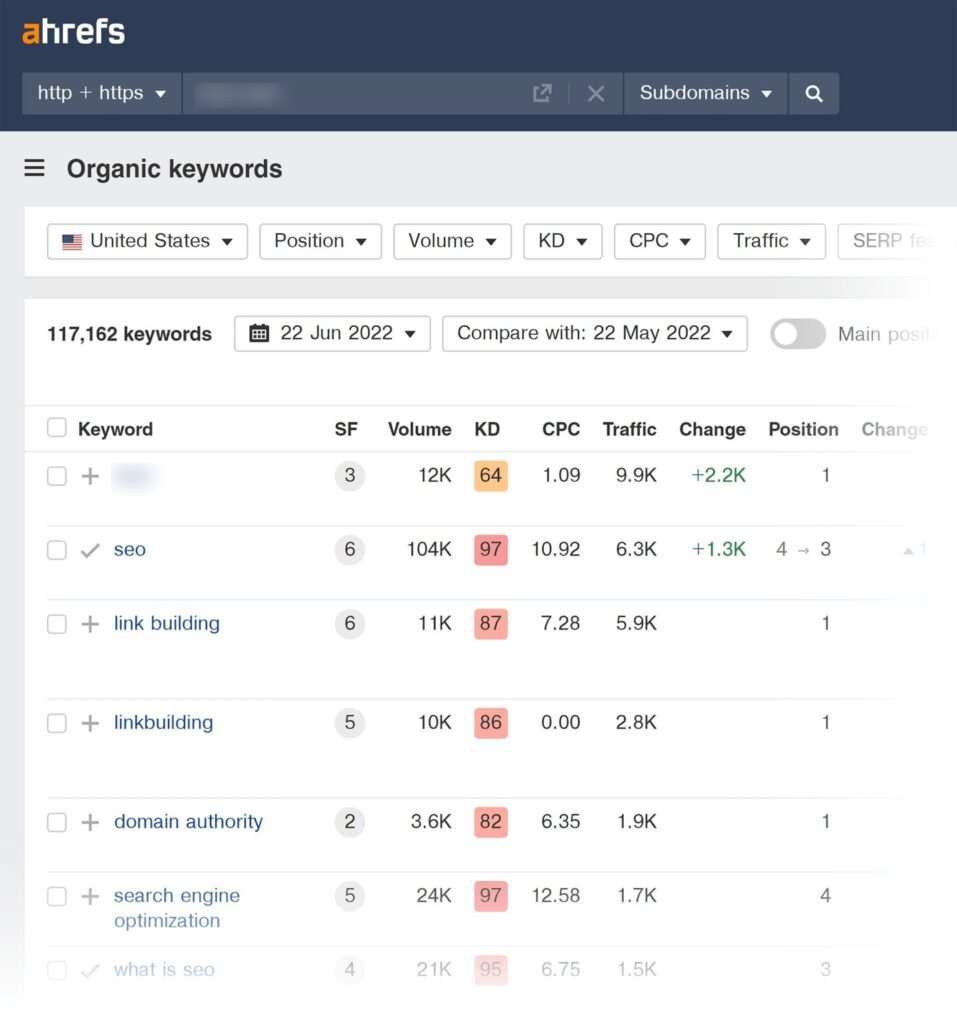
Here, Ahrefs generates all the keywords that your competitors rank for. You can use this data to uncover new keywords that you should target as well.
Advanced metrics for deeper insights: Wouldn’t you live to know if it’s really worth ranking for a certain keyword? If you’re looking to do some advanced analysis for a given keyword, you’ll love this data.
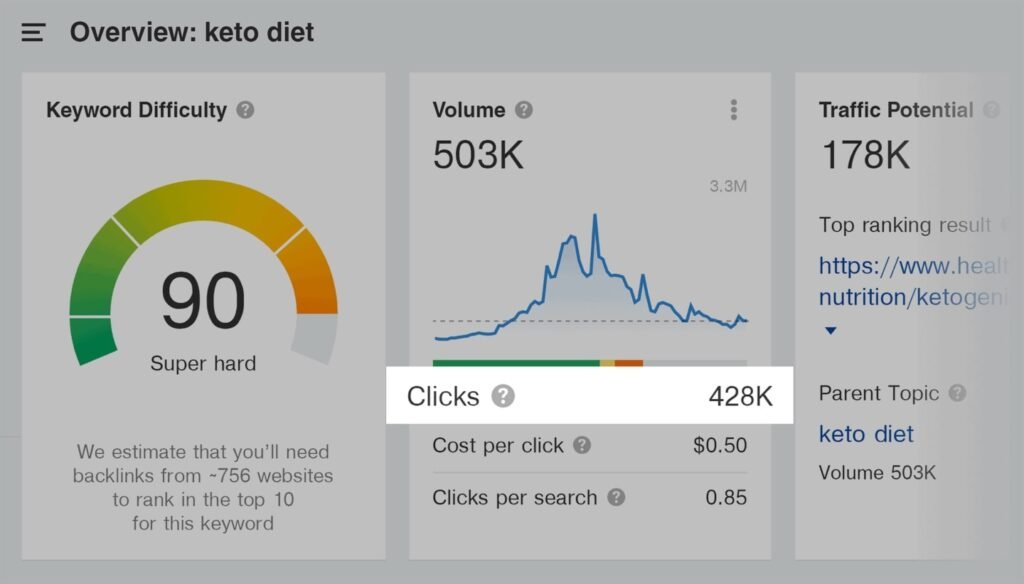
For your chosen keyword, you can see the following metrics:
- % of Paid Clicks vs Organic Clicks: This data shows how traffic is divided between ads and organic search results for a given keyword.
- Clicks Per Search: On average, how many search result pages users click on after searching for a particular keyword?
- Return Rate: This Unique Ahrefs metric checks to what extent a keyword is searched again and again.
SERP overview: The SERP Overview is another awesome feature that’s unique to Ahrefs. With it, you can analyze the top-ranking pages for a keyword and their key SEO metrics. I use this a lot when I am trying to figure out why a certain page ranks the way it does.
Backlink Analysis
With regard to backlink analysis, Ahrefs provides two key tools: Site Explorer and Content Explorer.
Site explorer: With this tool, you can dissect any website’s backlink profile to a granular level. Just type in the website name, and Ahrefs will give you all its referring domains.
Besides the domains, you get valuable data on keywords, DR (Domain Rating), UR (URL Rating), inbound links, anchor text, and outbound links. These metrics help you understand the best websites that you should contact for link building.
Content Explorer: If you use BuzzSumo, then you already know what this feature does. It helps you discover the best-performing content on a given topic.
So you an understand what makes it tick, and use that learning to create content more likely to earn baccklinks.
The data you get with this feature can be filtered based on criteria such as organic traffic, social shares, and referring domains.
There’s one more way Content Explorer can help you. And that is by identifying broken link-building targets. In other words, it lets you discover dead pages with lot of backlinks.
All you need to do is create a working replacement for that dead page on your own website. Then you can contact those linking to the dead page and ask them to link to you instead.
Technical SEO audit
Why is your website not ranking high enough? It could be one of the on-page or technical SEO factors. Ahrefs’ site audit tool can point those out.
Just like Semrush, Ahrefs provides you with an SEO health score.
The Site Audit groups issues into different categories for easy navigation and comprehension. Plus, the colorful charts help you visualize data for better understanding.
The site audit tool analyzes your website for more than 100 SEO issues such as:
- External pages
- Duplicate or missing HTML tags
- Pages with no social tags
- Improper length of title, H1, and meta description tags
- Problems with images and JavaScript
- Limited word counts and duplicate pages
- Incoming links and orphan pages
- Broken links
- Performance problems (large HTML or CSS, slow loading pages)
Also, you can schedule the audits to run daily, weekly or monthly and keep tabs on your website’ SEO at all times.
Rank tracking
With the Ahrefs Rank Tracker, you can check Google rankings for your target keywords in 170 countries.
Just enter your chosen keywords, input the countries where you want to monitor the SERPs, and type in competitors’ websites.
Once you do that, Ahrefs starts monitoring the ranking data and sending you regular updates.
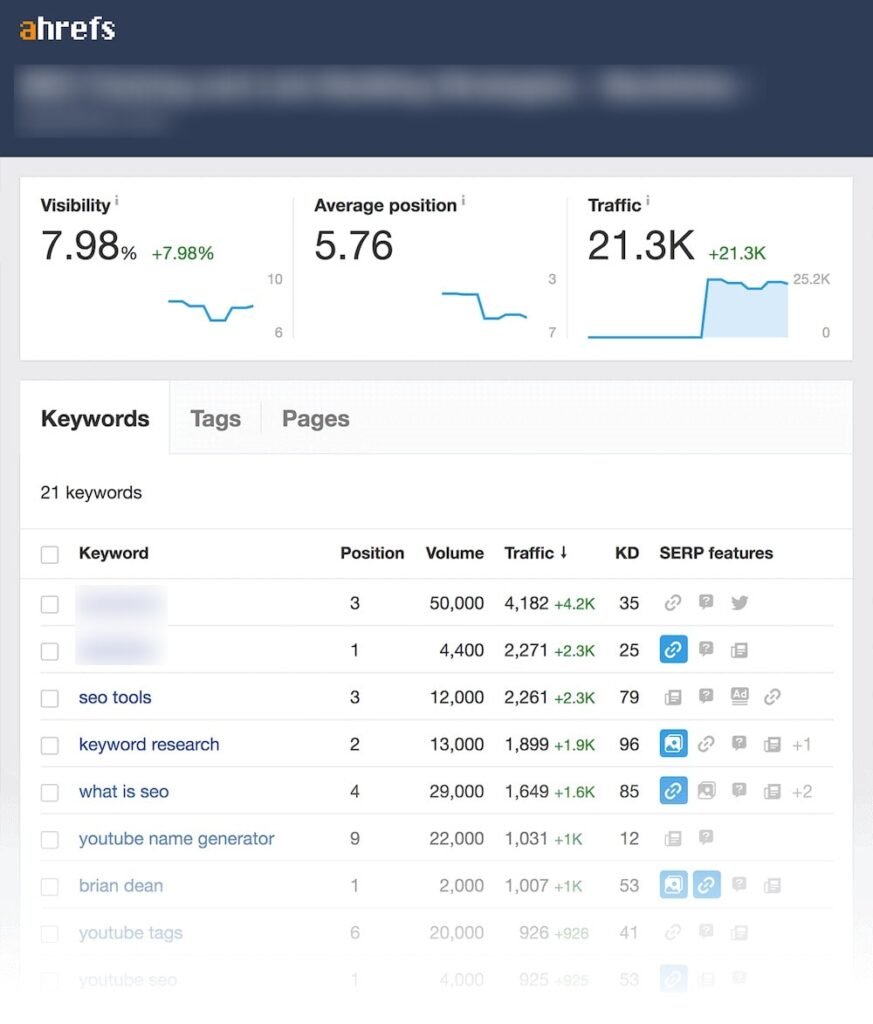
The interactive graphics you get in the ranking report provide you with historical data on metrics like visibility, traffic, and average position.
Other than that, you have the ability to compare your rankings with those of your competitors. So you can see where you are falling behind and take appropriate steps to improve.
Semrush vs Ahrefs feature comparison
Ahrefs boasts extensive backlink analysis, a large index, and granular metrics, ideal for in-depth competitor research.
Semrush offers comprehensive rank tracking, including SERP feature monitoring, and a broad suite of digital marketing tools, making it a holistic solution for SEO optimization. So who does it better? Let’s find out.
Rank tracking
As discussed above, both Semrush and Ahrefs have top notch rank tracking capabilities.
Ahrefs’ gives comprehensive information about rankings for keywords across several search engines such as Yahoo, Google, and Bing.
You get data on ranking fluctuations, SERP features, and search volumes, which helps optimize content and analyze competitors.
Semrush isn’t behind, with similar capabilities that let you monitor search engine rankings across various locations and devices. It also presents historical data for you to monitor trends and view the impact of your optimization efforts.
Other than that, you get insights on SERP features such as local packs and featured snippets. This gives you a clear sense of the SERPs.
Verdict: Both tools are equally effective in rank tracking.
Keyword research
At this phase of reading this Ahrefs vs Semrush review, you must be wondering who wins at keyword research. In that regard, I’d say Semrush has a slight edge over Ahrefs.
Ahrefs gives you data on metrics such as keyword difficulty, CPC, search volume, and clicks. But not competitive density and keyword trends. This data is supplied by Semrush.
Of cours, this doesn’t mean Ahrefs doesn’t shine anywhere. The part where Ahrefs is better than Semrush is in showing data from multiple search engines, where Semrush is concerned only with Google.
On top of that, Ahrefs is great for clickstream-related metrics.
When comparing the size of the keyword database, both Semrush and Ahrefs are top-notch, with each having around 20 billion keywords.
Verdict: It’s a really close call, but I’d prefer Semrush.
Website audit
Both Semrush and Ahrefs are capable of checking your site’s technical and on-page SEO. They can identify issues such as:
- Dead links
- High-density of keywords
- Crawl errors
- Large image sizes
- Slow website performance
- Duplicate content
- Missing titles and meta-descriptions
- SSL problems
However, there’s one small difference. Semrush gives you a simple list of recommendations to address your SEO problems. On the other hand, Ahrefs will need you to manually scan the audit and make your custom list of steps.
Verdict: Semrush wins in this area.
Backlink analysis
When it comes to link index, Ahrefs has a bigger backlink database and granular data points. This makes it a great tool for competitor analysis and in-depth research.
In fact, Ahrefs is known for its vast backlink database, which is the same as what a search engine would have.
Plus, it has some unique features like Link Intersect. It lets you see overlapping backlinks of competitors. So you can discover link-building opportunities that are more likely to succeed.
In contrast, Semrush also has powerful backlink analysis features. And what makes it unique is the backlink audit tool.
With this tool, you can recognize toxic backlinks that can damage your SEO success. You can then disavow these backlinks to minimize the impact on your website’s reputation and SEO authority.
Verdict: When it comes to link building, Ahrefs is slightly better than Semrush.
Semrush vs Ahrefs pricing
Both Semrush and Ahrefs provide a range of subscription options designed to suit various user requirements and financial plans.
Semrush pricing
Semrush comes with four pricing plans for you to pick from:
- Free
- Pro: $108.33/month
- Guru: $208.33/month
- Business: $416.66/month
As you can imagine, the free plan comes with many limitations. It’s not a good fit if you’re serious about SEO. But you use it as a starting point to test out the platform.
The Pro plan is good for new entrepreneurs and freelancers. The Guru plan will appeal to SMEs, marketing professionals, and growing agencies. And the Business plan is perfect for large enterprises and agencies with an established online presence.
Ahrefs pricing
Ahrefs also has four pricing plans catering to different budgets and SEO requirements:
- Lite: $108/month
- Standard: $208/month
- Advanced: $374/month
- Enterprise: Custom
Although there is no free plan, The Lite plan is a steal considering the features and value you get from the tool. And it’s great for SEO beginners and freelancers.
Small to medium-sized businesses would obviously prefer the Standard plan or higher, while larger organizations can go with Advanced or Enterprise plans.
Ahrefs vs Semrush FAQs
Let’s address the frequently asked questions surrounding these powerful platforms, providing clarity on their features, functionalities, and how they can supercharge your digital marketing efforts.
Is Semrush a free tool?
No. Semrush is a premium tool. While there is a fee plan, the functionality is very limited. For example, it lets you manage just one project and monitor only 10 keywords on a daily basis. If you need more, you should subscribe to a paid plan.
Does Semrush offer a free trial?
Yes! Semrush/s free 7-day trial is a great way to experiment with its features and interface. It needs you to register with your credit card, but you won’t be charged for the duration of your trial.
Is Semrush worth the money?
Semrush provides great value for money. Of course, it’s not cheap. Even the lowest tier plan costs $99/month. But it’s an investment that gets you a good return in the long term.
Is Ahrefs free?
Ahrefs is not free, and it doesn’t have any free plans. But you do get two months free if you subscribe to an annual plan.
Does Ahrefs come with a free trial?
No. There is no free trial with Ahrefs. But you do have free but limited access to several SEO tools.
Summing up: Semrush vs Ahrefs
As you can see, it’s hard to choose between Semrush and Ahrefs. Both are brilliant and both bring with them a powerful set of SEO tools. While Semrush excels at keyword research, Ahrefs has no match when it comes to backlink analysis.
But if I were to pick one, I’d probably go with Semrush due to its huge database and various additional features such as PPC advertising, social media, and content marketing. And that fact that it comes with a free plan and more affordable advanced plans adds to its appeal.
Did I miss anything? Did you try these tools? Do you have any questions or comments? Share your thoughts below in the comments section.



